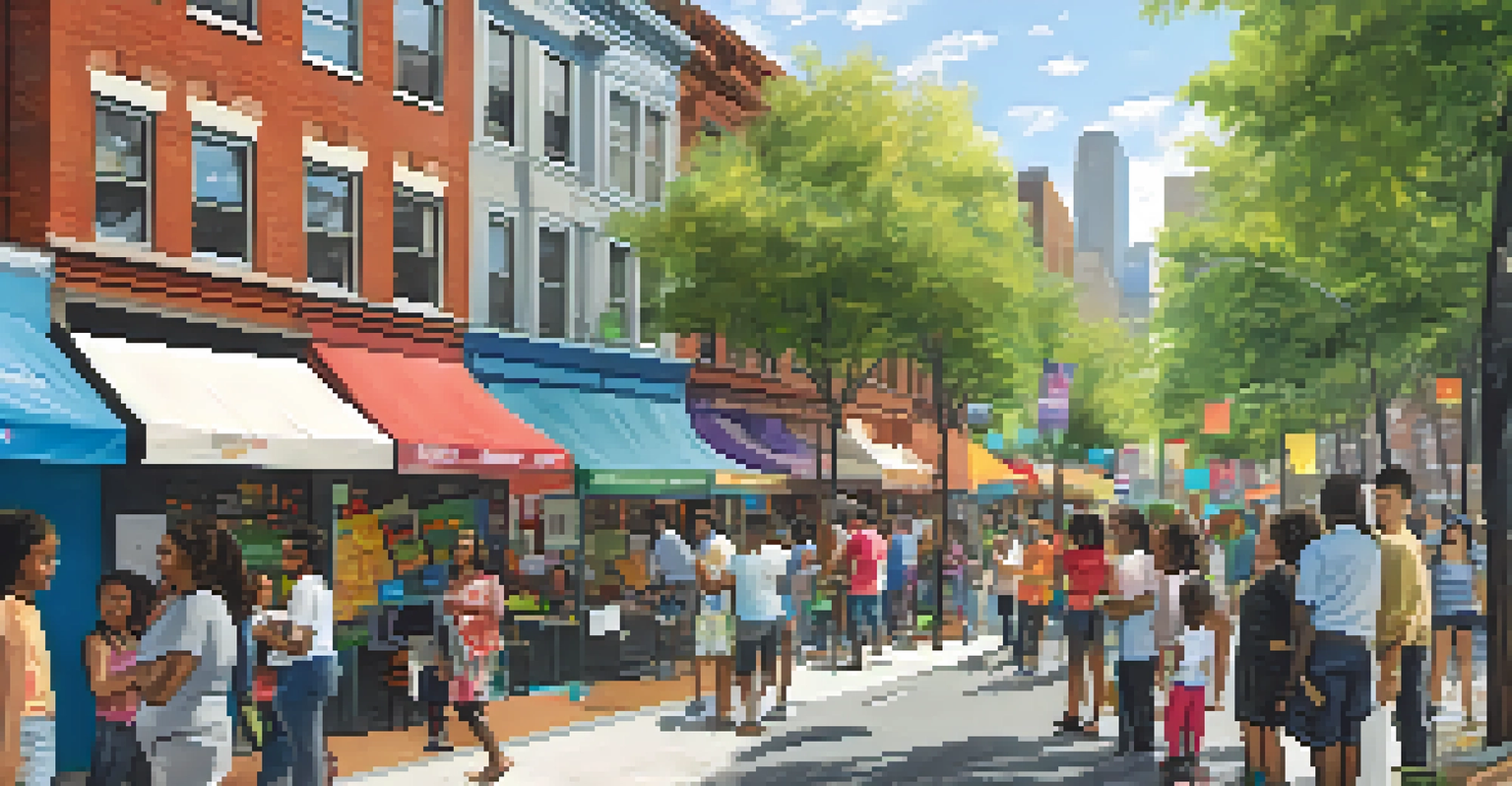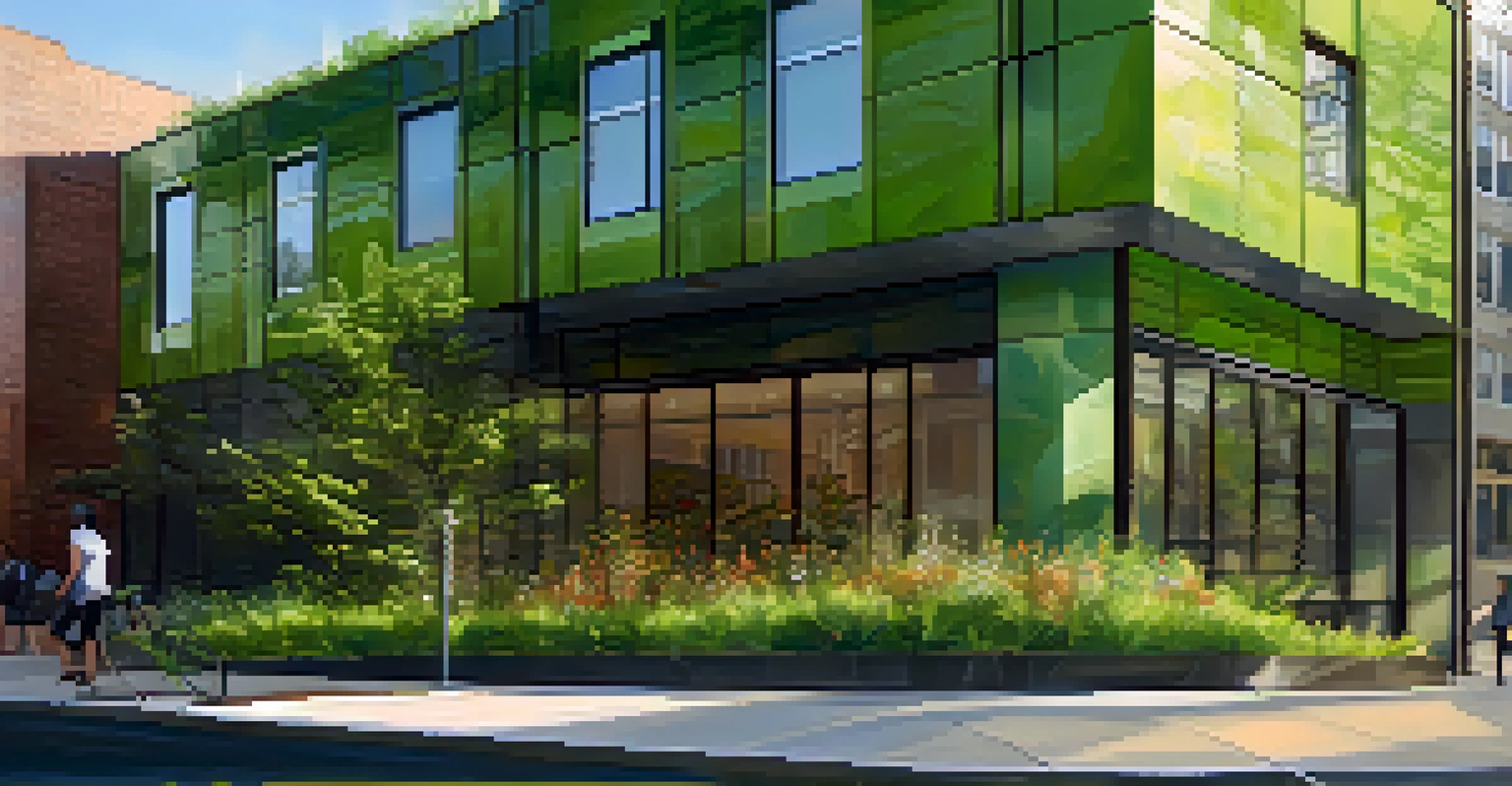Exploring Jersey City's Urban Planning Initiatives for Growth

Understanding Jersey City's Urban Planning Landscape
Urban planning is a crucial framework that shapes the growth of cities, and Jersey City is no exception. From zoning laws to public transport design, these initiatives serve as the backbone for a thriving urban environment. Understanding this landscape helps residents appreciate the thoughtful decisions behind their city’s development.
Urban planning is not just about building cities; it's about shaping the lives of the people who live in them.
Jersey City's planning initiatives aim to balance residential needs with commercial growth, ensuring that both sectors can thrive harmoniously. This balance is vital for creating vibrant neighborhoods where people want to live and work. A well-planned city can foster community engagement and improve the overall quality of life for its residents.
As Jersey City continues to evolve, the importance of effective urban planning becomes even clearer. With growth comes challenges, but proactive planning can address issues like congestion and green space accessibility. By looking at Jersey City's approach, we can see how urban planning is essential for sustainable growth.
Key Urban Planning Initiatives in Jersey City
Jersey City has implemented various urban planning initiatives aimed at enhancing its infrastructure and livability. One notable initiative is the development of the waterfront area, which transforms underutilized spaces into vibrant parks and commercial hubs. These projects not only beautify the city but also encourage recreational activities and tourism.

Another significant focus is the enhancement of public transportation options. By investing in reliable transit systems, Jersey City aims to reduce traffic congestion and promote sustainable commuting. This initiative is particularly important as the city grows and more residents seek efficient ways to travel.
Importance of Urban Planning
Effective urban planning in Jersey City fosters community engagement, balances residential and commercial needs, and enhances overall quality of life.
Moreover, affordable housing projects are a critical aspect of Jersey City's planning efforts. By prioritizing diverse housing options, the city aims to accommodate residents from various income levels, fostering an inclusive community. This commitment to affordable housing is vital for maintaining the city's character and ensuring everyone can call Jersey City home.
The Role of Community Engagement in Urban Planning
Community engagement is a cornerstone of successful urban planning initiatives in Jersey City. Residents are encouraged to voice their opinions and ideas, ensuring that development reflects the needs and desires of the community. This collaboration fosters a sense of ownership and pride among residents, making them active participants in shaping their city.
Sustainability is no longer about doing less harm. It's about doing more good.
Public meetings, surveys, and workshops are just a few ways the city gathers feedback from its residents. These platforms allow citizens to express their concerns, such as the need for more green spaces or improvements in public transportation. By actively listening to the community, Jersey City's planners can make informed decisions that truly benefit the population.
Additionally, involving the community in planning processes helps build trust between residents and local government. When people feel heard and valued, they are more likely to support urban initiatives. This partnership ultimately leads to a more cohesive city where everyone can contribute to its growth.
Sustainability Efforts in Urban Planning
Sustainability is at the forefront of Jersey City's urban planning initiatives, reflecting a growing trend in modern city development. The city is committed to reducing its carbon footprint by incorporating green building practices and promoting eco-friendly transportation options. This focus on sustainability not only benefits the environment but also enhances the city's appeal to future residents.
One example of this commitment is the integration of green roofs and energy-efficient designs in new constructions. These features help reduce energy consumption and improve air quality, making Jersey City a healthier place to live. Sustainable practices are not just about aesthetics; they also contribute to economic savings for both the city and its residents.
Sustainability in Development
Jersey City's commitment to sustainability includes green building practices and eco-friendly transportation, aiming to reduce its carbon footprint.
Moreover, Jersey City promotes the use of public transport and biking as alternatives to car travel. By creating safe, accessible pathways for cyclists and investing in public transit, the city aims to decrease traffic congestion and promote healthier lifestyles. This holistic approach to sustainability demonstrates Jersey City's dedication to creating a livable urban environment for generations to come.
Challenges Faced in Urban Planning
Despite its forward-thinking initiatives, Jersey City faces numerous challenges in urban planning. Rapid population growth can strain existing infrastructure, leading to issues like overcrowding and insufficient public services. Addressing these challenges requires proactive strategies and significant investment from both the city and its stakeholders.
Another challenge is balancing development with the preservation of historical sites. Jersey City is rich in history, and developers often face opposition when planning new projects near these significant locations. Finding a way to honor the city’s past while accommodating future growth is a delicate dance that demands careful consideration.
Additionally, funding remains a persistent hurdle for many urban initiatives. Budget constraints can limit the scope of projects, affecting the city's ability to implement comprehensive solutions. Creative funding strategies, such as public-private partnerships, can provide a way forward in overcoming these financial challenges.
The Impact of Technology on Urban Planning
Technology plays a transformative role in modern urban planning, and Jersey City is no exception. The use of Geographic Information Systems (GIS) allows planners to visualize data and make informed decisions about land use and infrastructure development. This technology enables a more strategic approach to urban growth, ensuring that resources are allocated effectively.
Smart city technologies, such as traffic management systems and automated public transportation, are also being explored in Jersey City. These innovations can enhance the efficiency of city services and improve the overall experience for residents. By embracing technology, the city can streamline operations and better respond to the needs of its citizens.
Community Engagement's Role
Involving residents in urban planning through feedback mechanisms cultivates a sense of ownership and trust, leading to more successful initiatives.
Furthermore, digital platforms for community engagement are becoming increasingly important. Online surveys and interactive maps allow residents to participate in planning discussions from the comfort of their homes. This accessibility can lead to greater involvement and ensure diverse voices are heard in the urban planning process.
Future Directions for Jersey City's Urban Planning
Looking ahead, Jersey City's urban planning initiatives will continue to evolve in response to emerging trends and challenges. The city's ongoing commitment to sustainability will likely shape future projects, as residents increasingly demand eco-friendly solutions. Incorporating green spaces and energy-efficient designs will be essential for creating a resilient urban environment.
Moreover, the focus on inclusivity in housing will become even more pronounced in the face of rising living costs. Jersey City will need to explore innovative solutions to provide affordable housing options while accommodating a growing population. This commitment to diversity will be vital for maintaining the city's unique character.

Finally, the integration of technology in urban planning will become more prevalent. As smart city initiatives gain traction, Jersey City is poised to harness data-driven insights to enhance its infrastructure and services. By leveraging technology, the city can create a more responsive, efficient, and livable environment for all its residents.